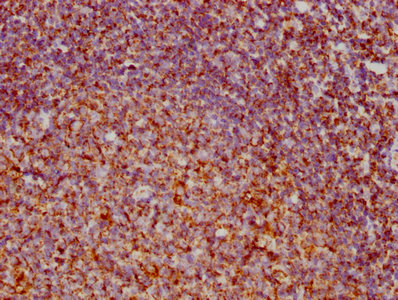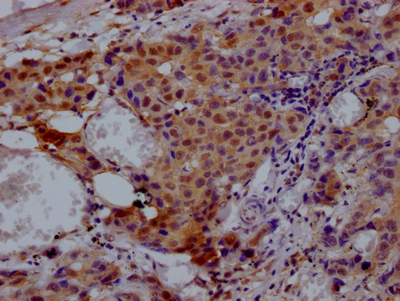HPSE2 Antibody
产品详情
-
产品名称:Rabbit anti-Homo sapiens (Human) HPSE2 Polyclonal antibody
-
Uniprot No.:Q8WWQ2
-
基因名:HPSE2
-
别名:HPSE2 antibody; HPA2 antibody; Inactive heparanase-2 antibody; Hpa2 antibody
-
宿主:Rabbit
-
反应种属:Human
-
免疫原:Recombinant Human Inactive heparanase-2 protein (42-242AA)
-
免疫原种属:Homo sapiens (Human)
-
标记方式:Non-conjugated
-
克隆类型:Polyclonal
-
抗体亚型:IgG
-
纯化方式:Antigen Affinity Purified
-
浓度:It differs from different batches. Please contact us to confirm it.
-
保存缓冲液:PBS with 0.02% sodium azide, 50% glycerol, pH7.3.
-
产品提供形式:Liquid
-
应用范围:ELISA
-
Protocols:
-
储存条件:Upon receipt, store at -20°C or -80°C. Avoid repeated freeze.
-
货期:Basically, we can dispatch the products out in 1-3 working days after receiving your orders. Delivery time maybe differs from different purchasing way or location, please kindly consult your local distributors for specific delivery time.
相关产品
靶点详情
-
功能:Binds heparin and heparan sulfate with high affinity, but lacks heparanase activity. Inhibits HPSE, possibly by competing for its substrates (in vitro).
-
基因功能参考文献:
- The results of this study the Heparanase 2 appeared overexpressed at different stages of Alzheimer disease. PMID: 28387673
- our results suggest that heparanase 2 functions as a tumor suppressor in bladder cancer PMID: 26968815
- we provide evidence that Hpa2 overexpression in head and neck cancer cells markedly reduces tumor growth PMID: 27013193
- The most common HPA genotypes among Saudis were HPA-1 a + b- (75%), HPA-2 a + b- (62%), HPA-3 a + b- (51.5%), HPA-4 a + b- (99%), HPA-5 a + b- (76.5%), HPA-6 a + b- (100%) and HPA-15 a + b + (50%). The prevalent allele among the HPA systems was (a), except in the HPA-15 system where the (b) allele was found in 52% of the subjects. PMID: 27019315
- Our findings identified these 2 genes as a novel breast cancer biomarker gene set, which may facilitate the diagnosis and treatment in breast cancer clinical therapies. PMID: 26084486
- HPSE2 mutations were found in one Urofacial syndrome family but not detected in patients with non-neurogenic neurogenic bladder and severe lower urinary tract dysfunction PMID: 25924634
- Heparanase 2 is more intensely expressed in the glandular tissue of cancer than in nonneoplastic endometrium; the HPSE2 expression in the stromal tissue is higher in the nonneoplastic controls compared with cancer mainly in the secretory endometrium. PMID: 25423319
- autonomic neural protein implicated in bladder emptying PMID: 25145936
- High expression of heparanase-2 is associated significantly with gastric tumor growth and differentiation PMID: 24139593
- Data indicate that the overexpression of HPSE1 and HPSE2 in the intervertebral degenerated discs suggests a role for these factors in mediating extracellular matrix remodeling in degenerative discs during disease development. PMID: 23370684
- HPSE2 c.631T>C (p.Y211H) is a novel benign SNP and c.1628A>T (p.N543I) is the disease-causing mutation in urofacial syndrome. PMID: 21332471
- A large region of marker homozygosity was observed at 10q24, consistent with known autosomal recessive inheritance, family consanguinity and previous genetic mapping in other families with Ochoa syndrome. PMID: 21450525
- Studies indicate that cathepsin L as the heparanase activating protease. PMID: 21308479
- These results indicate a regulatory effect of heparanase on TFPI and TFPI-2 in trophoblasts, suggesting a potential involvement of heparanase in early miscarriages. PMID: 20031192
- We now report evidence that Heparanse 2 (HPSE2) is the culprit gene for the syndrome. Mutations with a loss of function in the Heparanase 2 (HPSE2) gene PMID: 20560209
- Homozygous exonic deletions, nonsense mutations, and frameshift mutations in five further unrelated families confirmed HPSE2 as the causative gene for UFS PMID: 20560210
- Results demonstrated that the effectors from heparanase peptide-immunized mice could effectively lyse various tumor cells that were heparanase positive and HLA-A*0201 matched. PMID: 20182872
- Heparanase 2 is involved in neoplastic proliferation, but it was not exclusively associated with the malignant process. PMID: 19955924
- Heparanase may facilitate invasion and metastasis of gastric carcinoma cells. PMID: 15475937
- Study demonstrating that increased heparanase expression in prostate cancer tissues is due to promoter hypomethylation and up-regulation of transcription factor EGR1. PMID: 15709168
- Heparanase expression seems to be involved in the invasiveness and aggressiveness of head and neck squamous cell carcinomas. PMID: 15837740
- Heparanase expression is inversely correlated with survival of nasopharyngeal carcinoma (NPC) patients, indicating heparanase is a reliable prognostic factor, and further supports that heparanase is a valid target for the development of anti-cancer drugs. PMID: 16879396
- HPSE plays a role in extracellular matrix remodeling and in increasing heparin-binding growth factor release during embryo implantation. PMID: 17989358
- Data suggest that loss of modified heparan sulphate in the GBM is mediated by an increased heparanase presence and may play a role in the pathogenesis of diabetes-induced proteinuria. PMID: 18058084
显示更多
收起更多
-
相关疾病:Urofacial syndrome 1 (UFS1)
-
亚细胞定位:Secreted, extracellular space, extracellular matrix.
-
蛋白家族:Glycosyl hydrolase 79 family
-
组织特异性:Widely expressed, with the highest expression in brain, mammary gland, prostate, small intestine, testis and uterus. In the central nervous system, expressed in the spinal chord, caudate nucleus, thalamus, substantia nigra, medulla oblongata, putamen and
-
数据库链接:
HGNC: 18374
OMIM: 236730
KEGG: hsa:60495
STRING: 9606.ENSP00000359583
UniGene: Hs.500750
Most popular with customers
-
-
YWHAB Recombinant Monoclonal Antibody
Applications: ELISA, WB, IF, FC
Species Reactivity: Human, Mouse, Rat
-
Phospho-YAP1 (S127) Recombinant Monoclonal Antibody
Applications: ELISA, WB, IHC
Species Reactivity: Human
-
-
-
-
VDAC1 Recombinant Monoclonal Antibody
Applications: ELISA, WB, IHC
Species Reactivity: Human, Mouse, Rat
-
VCP Recombinant Monoclonal Antibody
Applications: ELISA, WB, IHC, IF, IP
Species Reactivity: Human, Rat





















